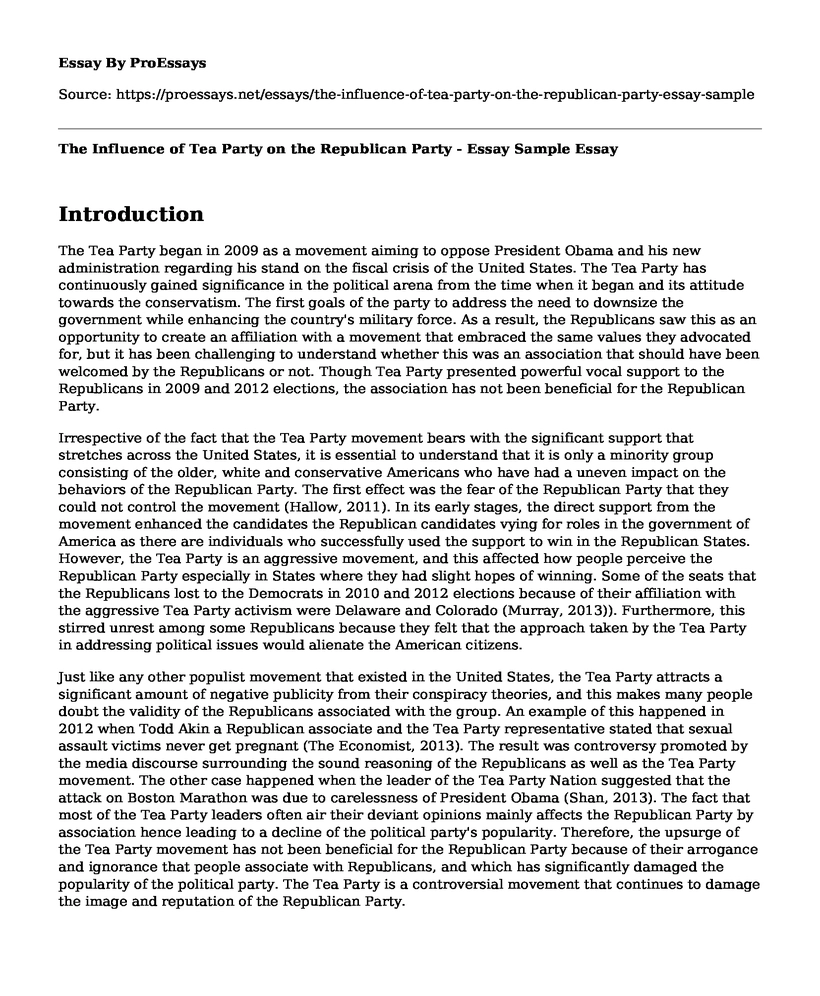Introduction
The Tea Party began in 2009 as a movement aiming to oppose President Obama and his new administration regarding his stand on the fiscal crisis of the United States. The Tea Party has continuously gained significance in the political arena from the time when it began and its attitude towards the conservatism. The first goals of the party to address the need to downsize the government while enhancing the country's military force. As a result, the Republicans saw this as an opportunity to create an affiliation with a movement that embraced the same values they advocated for, but it has been challenging to understand whether this was an association that should have been welcomed by the Republicans or not. Though Tea Party presented powerful vocal support to the Republicans in 2009 and 2012 elections, the association has not been beneficial for the Republican Party.
Irrespective of the fact that the Tea Party movement bears with the significant support that stretches across the United States, it is essential to understand that it is only a minority group consisting of the older, white and conservative Americans who have had a uneven impact on the behaviors of the Republican Party. The first effect was the fear of the Republican Party that they could not control the movement (Hallow, 2011). In its early stages, the direct support from the movement enhanced the candidates the Republican candidates vying for roles in the government of America as there are individuals who successfully used the support to win in the Republican States. However, the Tea Party is an aggressive movement, and this affected how people perceive the Republican Party especially in States where they had slight hopes of winning. Some of the seats that the Republicans lost to the Democrats in 2010 and 2012 elections because of their affiliation with the aggressive Tea Party activism were Delaware and Colorado (Murray, 2013)). Furthermore, this stirred unrest among some Republicans because they felt that the approach taken by the Tea Party in addressing political issues would alienate the American citizens.
Just like any other populist movement that existed in the United States, the Tea Party attracts a significant amount of negative publicity from their conspiracy theories, and this makes many people doubt the validity of the Republicans associated with the group. An example of this happened in 2012 when Todd Akin a Republican associate and the Tea Party representative stated that sexual assault victims never get pregnant (The Economist, 2013). The result was controversy promoted by the media discourse surrounding the sound reasoning of the Republicans as well as the Tea Party movement. The other case happened when the leader of the Tea Party Nation suggested that the attack on Boston Marathon was due to carelessness of President Obama (Shan, 2013). The fact that most of the Tea Party leaders often air their deviant opinions mainly affects the Republican Party by association hence leading to a decline of the political party's popularity. Therefore, the upsurge of the Tea Party movement has not been beneficial for the Republican Party because of their arrogance and ignorance that people associate with Republicans, and which has significantly damaged the popularity of the political party. The Tea Party is a controversial movement that continues to damage the image and reputation of the Republican Party.
References
Hallow, R. (2011). Tea party 2012 effect stirs GOP trepidation. Retrieved from http://www.washingtontimes.com/news/2011/may/29/tea-party-2012-effect-stirs-gop-trepidation/?page=all
Murray, M. (2013). The Tea Party, four years later. Retrieved from http://firstread.nbcnews.com/_news/2013/04/16/17780916-the-tea-party-four-years-later?lite
Shan, J. (2013). Tea Party Nation: Boston Attack Occurred Because Obama Administration 'Not Committed to Protecting America'. Retrieved from http://hinterlandgazette.com/2013/04/tea-party-nation-blames-boston-bomb-blast-obama-not-committed-protecting-americans.html
The Economist. (2013). The Politics of Purity. Retrieved from http://www.economist.com/news/united-states/21571878-republicans-argue-about-2012s-primaries-they-are-really-debating-their-future
Cite this page
The Influence of Tea Party on the Republican Party - Essay Sample. (2022, Jul 11). Retrieved from https://proessays.net/essays/the-influence-of-tea-party-on-the-republican-party-essay-sample
If you are the original author of this essay and no longer wish to have it published on the ProEssays website, please click below to request its removal:
- Century of Violence
- The Battle of Gettysburg Essay Example
- Spartan and Athenian Archaic Societies by Using Plutarch's Life of Lycurgus and Life of Solon
- Revolutionary War: Patriots vs Loyalists - Essay Sample
- Essay on Founding Fathers & US Constitution: The Federalists & Anti-Federalists
- Haiti Revolution: Slaves' Rebellion & Global Impact - Essay Sample
- Essay Example on Holocaust: Atrocity, Anguish, & Senseless Mass Murder







